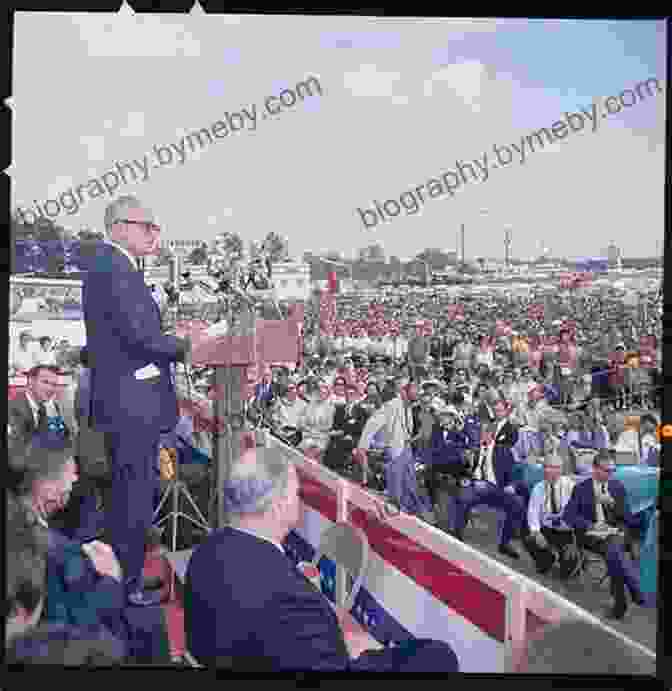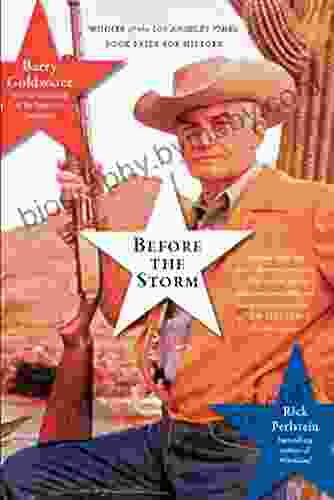Barry Goldwater and the Unmaking of the American Consensus

In 1964, Barry Goldwater, a conservative Republican senator from Arizona, ran for president against incumbent Democrat Lyndon B. Johnson. Goldwater's campaign was seen as a watershed moment in American politics, and his defeat marked the end of the post-World War II consensus on domestic and foreign policy.
4.6 out of 5
| Language | : | English |
| Text-to-Speech | : | Enabled |
| Enhanced typesetting | : | Enabled |
| X-Ray | : | Enabled |
| Word Wise | : | Enabled |
| File size | : | 3510 KB |
| Screen Reader | : | Supported |
| Print length | : | 705 pages |
In his book, "Barry Goldwater and the Unmaking of the American Consensus," historian Rick Perlstein provides a fascinating and meticulously researched account of Goldwater's campaign and its impact on American politics. Perlstein argues that Goldwater's campaign was a reaction to the social and economic changes that had taken place in the United States since the end of World War II.
These changes included the rise of the civil rights movement, the increasing influence of the federal government in American life, and the growing gap between rich and poor. Goldwater's campaign promised to roll back these changes and return America to a more traditional, conservative path.
Perlstein's book is full of vivid descriptions of Goldwater's campaign, from his early days as a long-shot candidate to his eventual defeat in the general election. Perlstein also provides a detailed analysis of the political forces that shaped Goldwater's campaign, including the rise of the conservative movement and the growing influence of the media.
"Barry Goldwater and the Unmaking of the American Consensus" is a must-read for anyone interested in American politics and history. Perlstein's book is a fascinating and insightful account of a pivotal moment in American history.
Goldwater's Campaign
Goldwater's campaign was based on a platform of conservatism. He promised to reduce the size of the federal government, cut taxes, and end the war in Vietnam. He also supported the right to bear arms, school prayer, and a strong military.
Goldwater's campaign was controversial from the start. His conservative views alienated many voters, and his support for the use of nuclear weapons in Vietnam was seen as reckless by many. However, Goldwater's campaign also attracted a large following of conservative voters who were unhappy with the direction of the country.
Goldwater's campaign culminated in the Republican National Convention in San Francisco in July 1964. The convention was a chaotic affair, and Goldwater's nomination was only secured after a bitter fight with the more moderate elements of the party.
In the general election, Goldwater faced off against incumbent Democrat Lyndon B. Johnson. Johnson was a popular president, and he easily defeated Goldwater in a landslide. However, Goldwater's campaign had a lasting impact on American politics.
The Impact of Goldwater's Campaign
Goldwater's campaign marked the end of the post-World War II consensus in American politics. The consensus, which had been based on a belief in the importance of government intervention in the economy and the pursuit of social justice, was shattered by Goldwater's campaign.
Goldwater's campaign also led to the rise of the conservative movement in American politics. The conservative movement, which had been growing in strength since the 1950s, was energized by Goldwater's campaign. The movement would go on to play a major role in American politics for decades to come.
Goldwater's campaign also had a lasting impact on the Republican Party. The party, which had been dominated by moderate elements for decades, became increasingly conservative in the wake of Goldwater's campaign. This shift would eventually lead to the party's embrace of Ronald Reagan and the conservative agenda he represented.
"Barry Goldwater and the Unmaking of the American Consensus" is a fascinating and insightful account of a pivotal moment in American history. Perlstein's book is a must-read for anyone interested in American politics and history.

4.6 out of 5
| Language | : | English |
| Text-to-Speech | : | Enabled |
| Enhanced typesetting | : | Enabled |
| X-Ray | : | Enabled |
| Word Wise | : | Enabled |
| File size | : | 3510 KB |
| Screen Reader | : | Supported |
| Print length | : | 705 pages |
Do you want to contribute by writing guest posts on this blog?
Please contact us and send us a resume of previous articles that you have written.
 Book
Book Novel
Novel Page
Page Chapter
Chapter Text
Text Story
Story Genre
Genre Reader
Reader Library
Library Paperback
Paperback E-book
E-book Magazine
Magazine Newspaper
Newspaper Paragraph
Paragraph Sentence
Sentence Bookmark
Bookmark Shelf
Shelf Glossary
Glossary Bibliography
Bibliography Foreword
Foreword Preface
Preface Synopsis
Synopsis Annotation
Annotation Footnote
Footnote Manuscript
Manuscript Scroll
Scroll Codex
Codex Tome
Tome Bestseller
Bestseller Classics
Classics Library card
Library card Narrative
Narrative Biography
Biography Autobiography
Autobiography Memoir
Memoir Reference
Reference Encyclopedia
Encyclopedia Anna Claybourne
Anna Claybourne Brandon Sieh
Brandon Sieh Pamela Lynn
Pamela Lynn Tony Mitton
Tony Mitton Armin Weber
Armin Weber Raoul Wallenberg
Raoul Wallenberg Annie Bellet
Annie Bellet Anna Lowenhaupt Tsing
Anna Lowenhaupt Tsing Jonathan Eig
Jonathan Eig Anna Hagele
Anna Hagele Thomas Pranio
Thomas Pranio Mark R Leary
Mark R Leary Anna Botsford Comstock
Anna Botsford Comstock Anne Dublin
Anne Dublin Anthony Drago
Anthony Drago Anna M Lewis
Anna M Lewis Mark Lazerus
Mark Lazerus William D Lopez
William D Lopez Laurie Gough
Laurie Gough Josh Bernoff
Josh Bernoff
Light bulbAdvertise smarter! Our strategic ad space ensures maximum exposure. Reserve your spot today!

 Arthur Conan Doyle30 Days to a Stronger Child: A Revolutionary Guide to Building Strength,...
Arthur Conan Doyle30 Days to a Stronger Child: A Revolutionary Guide to Building Strength,... Branden SimmonsFollow ·13.9k
Branden SimmonsFollow ·13.9k Ted SimmonsFollow ·4.7k
Ted SimmonsFollow ·4.7k Blake KennedyFollow ·8.7k
Blake KennedyFollow ·8.7k Desmond FosterFollow ·13.5k
Desmond FosterFollow ·13.5k Aaron BrooksFollow ·8.5k
Aaron BrooksFollow ·8.5k Damon HayesFollow ·3.8k
Damon HayesFollow ·3.8k Travis FosterFollow ·13.9k
Travis FosterFollow ·13.9k Hank MitchellFollow ·3.7k
Hank MitchellFollow ·3.7k

 Juan Rulfo
Juan RulfoThe Easy Ingredient Ketogenic Diet Cookbook: Your...
Embark on a culinary adventure that...

 Zachary Cox
Zachary CoxDepression Hates a Moving Target: A Groundbreaking...
Depression...

 Colin Richardson
Colin RichardsonUnleash Your Spine-Tingling Curiosity: Dive into the...
In the realm of...

 Evan Hayes
Evan HayesMarketing Fashion Portfolio: The Ultimate Guide to...
In the competitive world of fashion, it is...
4.6 out of 5
| Language | : | English |
| Text-to-Speech | : | Enabled |
| Enhanced typesetting | : | Enabled |
| X-Ray | : | Enabled |
| Word Wise | : | Enabled |
| File size | : | 3510 KB |
| Screen Reader | : | Supported |
| Print length | : | 705 pages |














